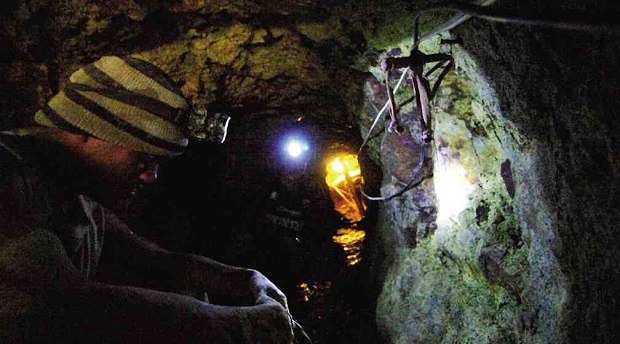Old law blocking less toxic mining technology

POCKET mining in the Cordilleras traces its roots back to the centuries before the Americans established the first mining operations in the 20th century. There are proposals to amend the small-scale mining law to allow these miners access to green technology. RICHARD BALONGLONG/INQUIRER NORTHERN LUZON
BAGUIO CITY – Amending an outdated small-scale mining law is necessary to allow the government to use clean technology for this sector of the metals industry, experts and industry stakeholders said at a University of the Philippines (UP) Baguio forum recently.
Professor Herman Mendoza, of the UP College of Engineering, presented an integrated mineral processing system, which was developed for the Department of Science and Technology’s (DOST) Better Mine Project.
The system combines two existing processes for separating minerals, like gold, silver and zinc, from the ore without using toxic chemicals.
The system has been set up in a prototype facility at UP Diliman and may be reproduced in four major mine sites in the country by 2016 to equip pocket miners with environmentally friendly technology, Mendoza said.
Current technology requires “cyanidization” (the use of a mixture of cyanide and water) and amalgamation (the use of mercury) to separate gold from basic silica, he said.
Mendoza said his team was able to develop an alternative process, which combines gravity concentration and mine flotation systems.
Gravity concentration is a technique that uses a centrifuge to separate minerals, which have different weights than the original ore, he said.
The mine flotation system uses chemicals and principles of buoyancy to separate the heavier ore (which sinks in a liquid compound) from the lighter and valuable minerals (which float) in order to distill the valuable metals, Mendoza said.
The facility, however, costs P7.6 million to fabricate and the cost may increase because ongoing studies suggest that the system must be designed according to the type of ore in a selected province, he said.
Gold deposits in Mt. Diwalwal in Mindanao, for example, are a combination of gold and silica, while Baguio deposits are concentrations of silica, gold, zinc and copper, Mendoza said.
Lomino Kaniteng, head of the Benguet Federation of Small-Scale Mining Associations, said the capitalization needed to use the new technology may breach an investment ceiling set by Republic Act No. 7076, or the People’s Small-Scale Mining Act of 1991.
The law, Kaniteng said, restricts pocket miners to an investment ceiling of P10 million per operation to unearth up to 50 metric tons of valuable metals, like gold, silver and chromite.
Kaniteng said the law had become outdated because many pocket mines today operated as medium-scale mines because of the much larger capital needed to sustain these projects.
The law also considers artisanal equipment, like hammers and pick axes, as appropriate technology for small-scale miners, he said, which would make the UP’s integrated mineral processor system illegal for pocket mining.
He said that since 2000, their counterparts in Mindanao had been urging Congress to repeal the small-scale mining law in order to free up the government from an old classification scale for mining.
The new green technology being popularized by UP is also a justification for a new mining law, he said.
“More than 50 percent of pocket miners operating in Benguet come from outlying provinces, so how can you teach people who are not from these Benguet communities to protect our environment?” Kaniteng said.
He said a green mining facility that could be accessed by every miner would address this problem.
Zenaida Hamada Pawid, former chair of the National Commission on Indigenous Peoples, said President Aquino’s new mining policy, as outlined in Executive Order No. 79, recognized the fact that RA 7076 “no longer applies” and must be modernized.
But Pawid and Professor Lorelei Mendoza, dean of the UP Baguio College of Social Sciences, cautioned people behind the DOST’s Better Mine Project against privatizing the system.
“Treat the Cordilleras as an example of the social dimension of the mining industry. This [system] is beautiful but in the hands of people who have the capital… they will corner the market,” Pawid said. Vincent Cabreza, Inquirer Northern Luzon